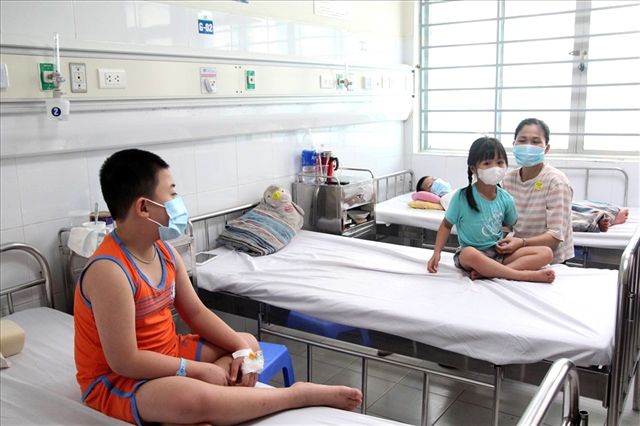 Society
Society

Dengue fever cases dropped significantly in Việt Nam during the first eight months of this year, but the country needed to remain vigilant as there were currently cases in 58 provinces and cities and the risk of a greater outbreak was extremely high, experts have said.

|
| Children being treated at the National Children’s Hospital. Photo laodong.vn |
HÀ NOI – Dengue fever cases dropped significantly in Việt Nam during the first eight months of this year, but the country needed to remain vigilant as there were currently cases in 58 provinces and cities and the risk of a greater outbreak was extremely high, experts have said.
According to the General Department of Preventive Medicine under the Ministry of Health, the number of dengue cases this year had reached 60,525 with seven deaths as of September 6. This was compared to 178,200 cases with 38 deaths reported during the same period last year.
Hà Nội is considered a hotspot for dengue fever in the North. The capital city has recorded a total of 2,200 cases since the beginning of this year, including two deaths.
The number of cases has decreased by 47.2 per cent compared to last year’s figure.
Hoàng Đức Hạnh, deputy director of Hà Nội's Department of Health, said the number of cases was likely to increase.
From September 7-13, 399 cases were reported in the city, 171 more than the previous week.
“This year dengue fever in Hà Nội first appeared in suburban districts such as Phúc Thọ, Thường Tín and Thanh Oai and then spread to the inner city. The epidemic reaches its peak between August and November every year and the number of cases will continue to increase until November,” he said.
Hạnh said the dengue fever epidemic this year might not turn into major outbreak but strengthened preventive measures were needed as it coincided with the COVID-19 pandemic.
The weather was among the factors accounting for the increase in dengue fever patients, he said, adding that hot weather along with rain creating favourable conditions for mosquitoes to transmit and develop.
Localities were being urged to spray for mosquitoes in high-risk areas or areas with dengue fever patients, Hạnh said.
In HCM City, as many as 500 new cases of dengue fever have been reported weekly over the past two months.
According to HCM City’s Centre for Disease Control and Prevention, the number of dengue fever cases had declined by 71.8 compared with the same period last year.
The city has seen 11,404 cases of dengue fever since the beginning of the year.
However, the figure has spiked in recent weeks. About 543 cases were reported in the last week of August in 13 out of HCM City’s 24 districts.
According to statistics from the Central Highlands' Institute of Hygiene and Epidemiology, the number of dengue fever cases across the region's five provinces in the first eight months of this decreased sharply compared to the same period in 2019.
Director of the institute Viên Chinh Chiến said most cases had been detected in remote areas that were home to ethnic minority groups. He pointed to a number of factors leading to the spread of the epidemic, including poor sanitation and inadequate public awareness of the issue.
In the following months, the unit would instruct those provinces to closely monitor the progress of the outbreak, he said.
Trịnh Quang Trị, deputy director of Dak Nong’s Centre for Disease Prevention and Control agreed.
The epidemic was very difficult to control due to the terrain, he said, adding that the province had recorded only 350 cases over the past eight months.
As the number of patients being hospitalised with dengue fever was on the rise, doctors advised people not to be complacent.
Nguyễn Văn Lâm from the National Children’s Hospital said over 60 children had so far been admitted for dengue fever treatment, mostly in August and September.
They were of different ages but fortunately there had been no critical or fatal cases.
He warned that in the early stages of dengue fever, it could easily be mistaken for another illness.
People should check for warning signs such as abdominal pain, bleeding under the skin, dehydration or vomiting, and children should be admitted to hospital if any of these showed up, he said.
According to Đỗ Duy Cường, director of the Centre for Tropical Diseases at Bạch Mai Hospital, patients with dengue fever usually recovered after seven days of treatment. However, about 5 per cent could become critical if they were not treated in time. — VNS